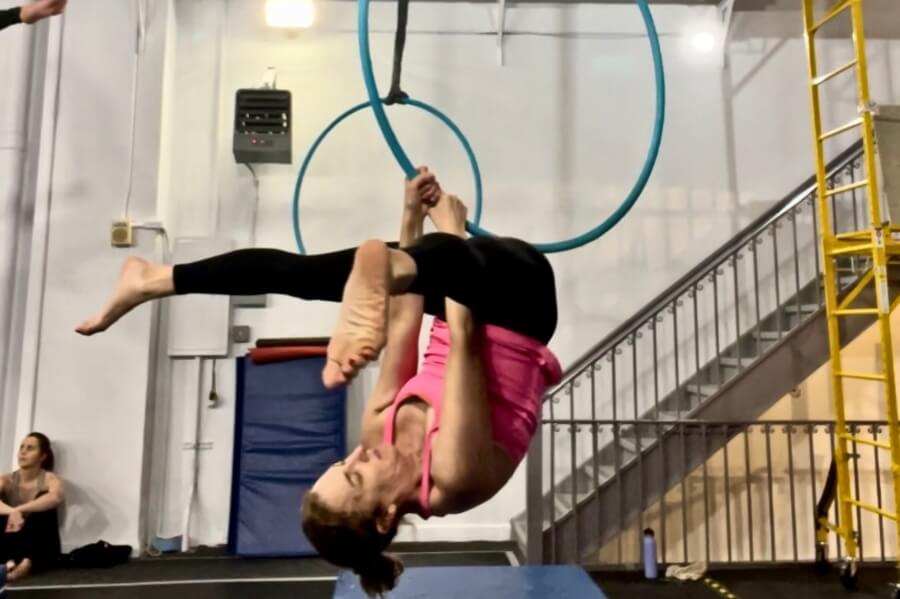I hadn’t heard of frozen shoulder syndrome until a few years ago, when I was suffering through acute pain. I certainly didn’t know it was connected to menopause. You would think somewhere along the way I would have learned about this, since I am a menopausal woman. But it’s just one of the aspects of this medical condition that is infuriating.
To explain, it helps to tell you a story of one snowy Christmas in Wisconsin:
I was surrounded by my boyfriend’s bustling family and the homey aromas of stew, melty cheese sauce, and his mom’s buttery homemade almond cookies that are one of my weaknesses. At Christmas time, this nice Jewish girl goes all in for Santa Claus and sweets. That’s me, in the corner, trying to stay out of the way of cooks and kids and eager dogs, wondering if just one more of those insanely yummy cookies would qualify as a reasonable lunch, butter being a legit protein source. I reach up for a mug—because a cup of coffee is the BFF of an almond cookie—and feel a twinge of pain in my right shoulder. I cannot recall an injury, so I move onward to the cookie tin and hope the pain will go away.
As the days pass, my right arm grows stiffer and weaker. I have to use my left arm to give my right arm a leg up, so to speak. By the time we get home to Brooklyn, the pain is a steady drone. No more yoga for me, but like busy women everywhere, I soldier on, working and organizing family life. Within a month, I am in sleepless excruciating pain, edging closer to 9 on the sad-face scale, even on a steady diet of Advil. I’ve been through childbirth, definitely a 10 on the pain scale, but at the end I had an adorable baby to show for my effort. This is relentless—24/7. No end, and no cute baby. I can barely hold a fork. I have to sign checks using my left hand to support my right.
Read More: What Every Woman Must Know About Osteoporosis Meds
My Medical Mystery
I make the rounds of physical therapists and specialists who cater to the injuries of professional football and tennis players. Torn rotator cuff is the diagnosis. My shoulder is inspected and injected with cortisone, but the pain continues, reaching Code Red, like someone is jabbing an ice pick into my shoulder. I can’t focus on work. I need help dressing. I’ve never felt so helpless in my adult life. What the bleep is happening to me?
Then I remember that my brother had some kind of shoulder issue a few years earlier. He reminds me that our mother also had a bad shoulder and sends me to Dr. Vijay Vad, a physiatrist at New York City’s Hospital for Special Surgery. In the days prior to my appointment, I resort to more red wine than is good for me—it seems to dampen the pain more enjoyably than Advil—and re-read George Eliot’s Middlemarch, which at 800-plus pages keeps me distracted in the 19th Century. Dorothea’s marriage woes are definitely a super 10 sad face on the emotional pain scale.
My shoulder is inspected and injected with cortisone, but the pain continues, reaching Code Red.
When Dr. Vad examines my shoulder and asks me to perform a few simple arm movements, I can barely move the dangling appendage on my right side. “This is adhesive capsulitis,” he says. “Frozen shoulder.” He describes the disease as a spontaneous inflammation of the soft tissue surrounding the shoulder joint. “I see so many women your age with this condition. But don’t worry, we’re going to fix this.” I’m so relieved I do some bawling right there in his office and feel better already.
He identifies a number of risk factors for this disease: 5 percent of women overall, mostly in peri-menopause and menopause (that’s me, and probably you, Dear Reader), 20 percent of diabetics; people with autoimmune disorders including thyroid disease, cardiac patients, patients who’ve had upper body surgery, and and people with a family history (my brother and my mom). He says that the winter onset time of my frozen shoulder is also a hallmark of the disease. But the majority of his frozen shoulder patients are women, just about my age. And yes, decreasing hormones are to blame. Frozen shoulder is a midlife woman thing. Ask around. I guarantee that if you haven’t had this nasty business, one of your friends has.
Will My Shoulder Ever Un-Freeze?

Image: Tanja Heffner/Unsplash
Dr. Vad explains four distinct stages of the disease, each with an optimal treatment solution. His mantra is early diagnosis, but unfortunately that doesn’t always happen. Because the disease will eventually resolve itself, patients are often still told to “wait it out,” resulting in many months or even years of needless suffering.
In Stage One, which is where I was when I reached for a coffee cup and winced, a sonogram-guided cortisone injection into the shoulder joint can eliminate the pain and quickly restore mobility.
By now I was in Stage Two, with severe pain and stiffness. Most doctors will advise arthroscopic surgery for this stage, which is invasive and expensive and can result in chronic pain and…a refrozen shoulder.
In Stage Three, the shoulder is completely frozen stiff and pain subsides. For this stage, arthroscopic surgery is the only treatment option.
Stage Four is described as the “thawing” period.
Dr. Vad prefers to treat my Stage Two case with a brief, inexpensive procedure called capsule distension. After a local anesthetic is administered, the shoulder joint is injected with saline to flush out and expand the joint, which has shrunk. Dr. Vad describes the texture of the inflamed joint as something like a well-chewed piece of gum. Yuck. After the saline, in goes some cortisone. Nice. Fifteen minutes, no incision, done. An ice pack, and you can head home to binge watch seasons of 30 Rock.
Following my successful capsule distension, I worked with a physical therapist to regain strength and mobility. I am back to Plank Pose and Downward Dog. I have let go of headstands and Reverse Prayer for now, but I’ve got biceps again, and I can reach for coffee mugs, which is awesome.
Read More: Got a Real Pain in the Neck? 6 Ways to Get Rid of It
Frozen Shoulder Syndrome and Menopause: The Slap in the Face from Insurance
Unfortunately for all the wonderful women out there who will get frozen shoulder, there is no insurance code for capsule distension. No insurance code means insufficient reimbursement for physicians, which means that most would rather do the expensive, invasive procedure for which they have been well-trained and will be fully reimbursed, than a brief, inexpensive procedure that requires minimal recovery time.
If men developed frozen shoulder in similar numbers, you can be sure that this inexpensive procedure would be widely available.
I was covered for my procedure because it was conducted in a hospital operating room in the city where I lived. But most women who could benefit from capsule distension treatment will not have access to a doctor willing or able to perform it. Dr. Vad treats patients who fly in from all over the country and beyond. But this is obviously not an option for most of us, and that is just crazy.
This is why frozen shoulder is a feminist issue. Considering the impact this bad-ass disease has on our productivity and personal joy, we should all be banging on doors, lobbying for capsule distention. As with other medical situations women face—childbirth, for example, or abortion, for another—if men developed frozen shoulder in similar numbers, you can be sure that this inexpensive procedure would be widely available. Instead, even if you ask for capsule distension, your doctor might edge you towards arthroscopy. Our hardworking female shoulders carry enough burdens without the pain of recovery from needless major surgery.
Dr. Vad looks to ongoing research to identify the underlying causes of adhesive capsulitis and other issues that affect women in midlife. He recommends an anti-inflammatory diet, and he’s a big believer in turmeric and oral vitamin D, which can have a positive impact on back pain, depression, and arthritis. I can personally attest to the benefits of all these strategies in keeping my 40-plus body flexible and healthy.
Until a miracle pill comes along that will zap adhesive capsulitis after Stage One, Dr. Vad hopes to create an environment where women in midlife are more informed and empowered. “With early intervention, we can save you months or years of suffering,” he says, restating his mantra. “If you have pain in your shoulder and there was no trauma, and you are beginning to lose range of motion, you should get to a doctor immediately. If a few weeks of physical therapy do not bring good results, you should demand treatment for adhesive capsulitis. If you feel you might have a frozen shoulder, don’t sit and wait—take charge.”
Which sounds like good advice for all our life challenges.
Further Reading
Unlocking Frozen Shoulder: A New Paradigm of Treatment





















0 Comments